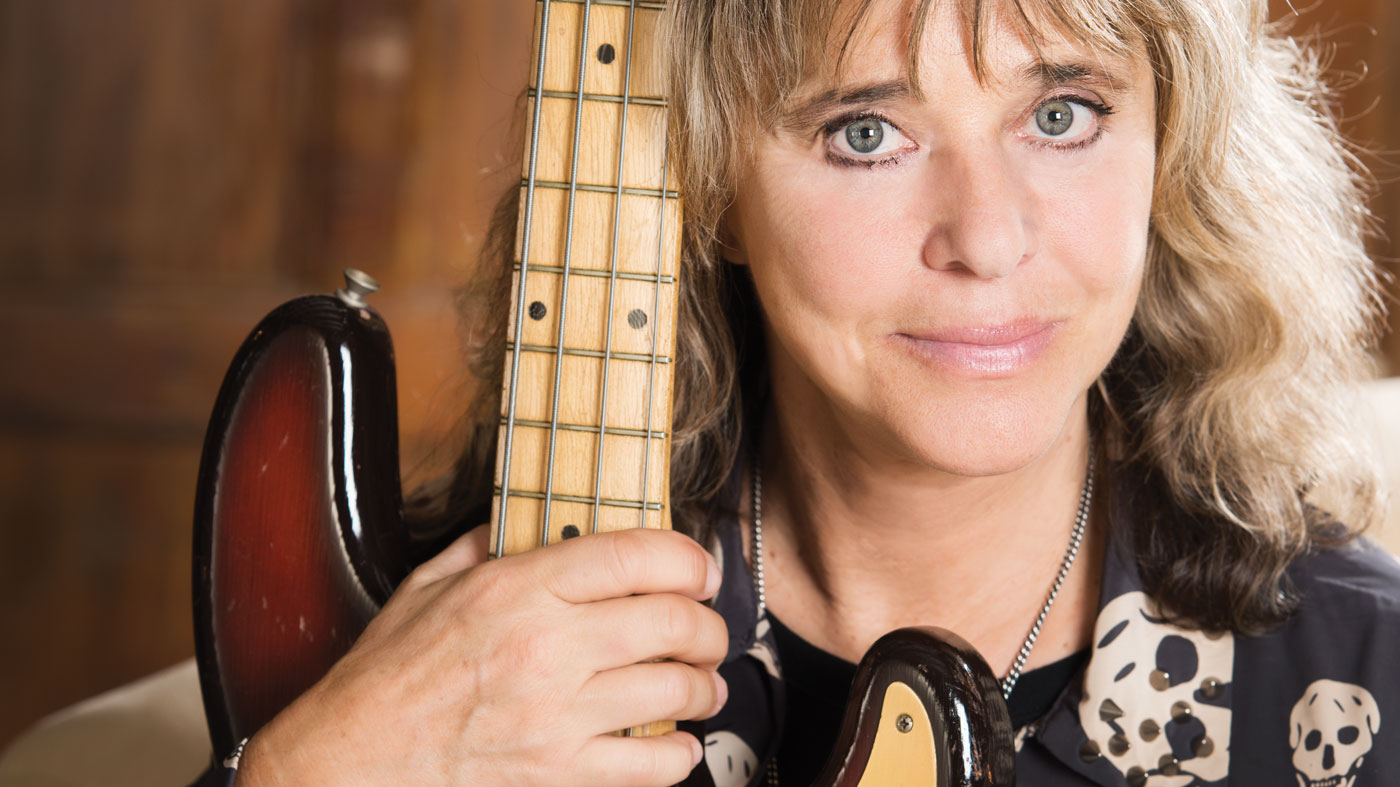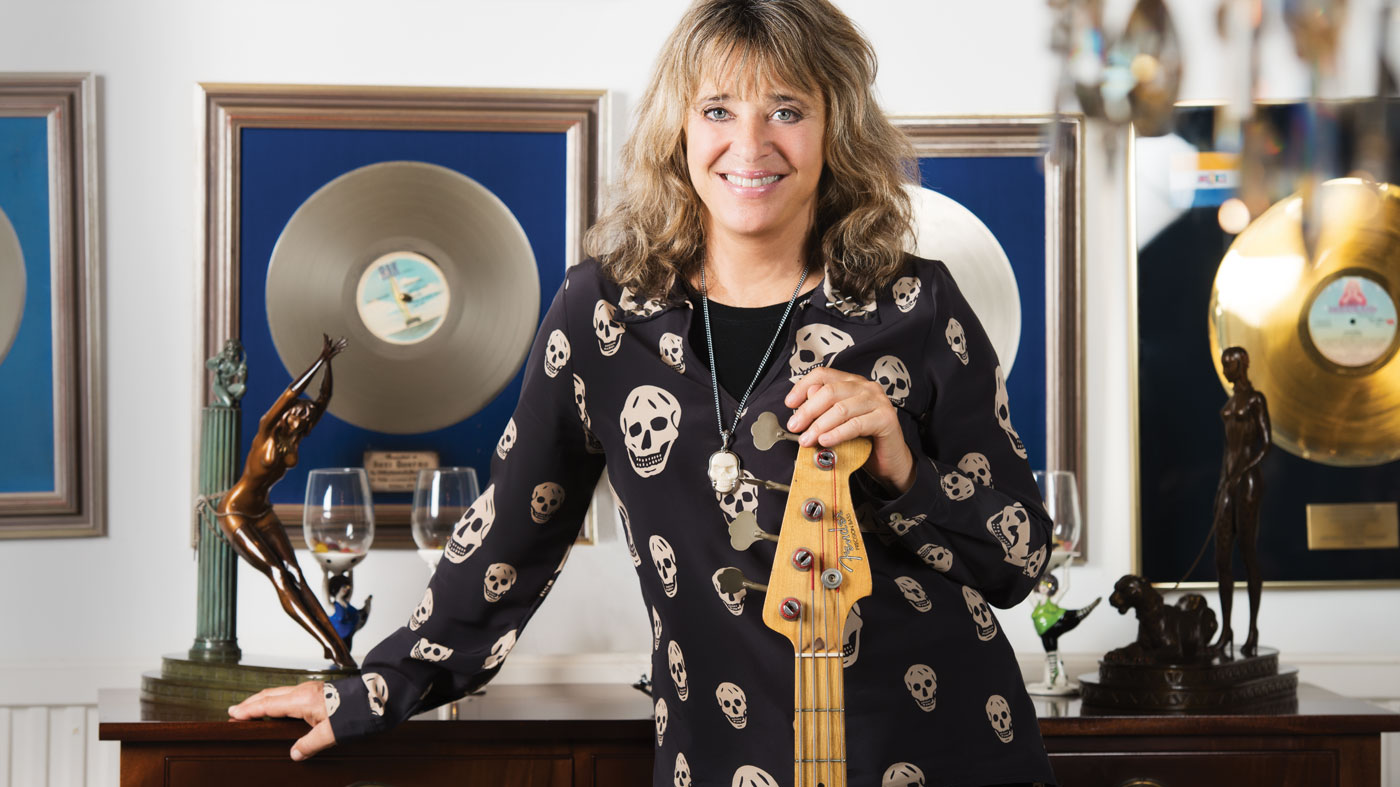Suzi Quatro: “The Precision is the only bass that you can plug directly into the board and it’s perfect”
Suzi Q talks gear changes, inspirations and five decades of bass

More than a decade ago, Suzi Quatro - or Dr Suzi Quatro, as she was made an Honorary Doctor of Music by Anglia Ruskin University at Cambridge last year - recorded a song called 15 Minutes Of Fame. By that time, the singer, songwriter, bassist, producer, actress, radio host, and author had long defied those odds.
“I should change it to Fifty-Three Years Of Fame,” she laughs. “What can I tell you? It’s my profession and I love it to this day. Every time I step onto the stage it’s like the first gig all over again. I love what I do.
I’m all about communication, entertainment, and creation. Those are my three key words
“When I come off the stage and I go into the dressing room, I often say to my husband, ‘I feel like me now.’ I’ve done it my whole life, I take what I do very seriously, and I like to make it real for the people. I’m all about communication, entertainment, and creation. Those are my three key words.”
In September, Chrysalis Records released The Best of Suzi Quatro: Legend, a digitally remastered compilation that she curated. It’s not her first such package, but it is a special one in that it doesn't only include her most famous hits, but also some of her favourite album tracks.
“My record company wanted to put something out, and I wanted to make it different,” she says.
“Hence the 20 tracks that I’ve chosen as personal favourites from my catalogue. I went through everything and it wasn’t easy. I have favourites on every album that I’m so proud of. On this compilation I picked all the songs that made it from album to stage. The only one we didn’t do live was Hollywood, and I don’t know why. I think it’s because the mood isn’t ‘me’ live, but it’s a great song. So there’s a good cross-section of my own songs, and I think I satisfied everyone.”
Her story is well documented. Born and raised in Detroit, Quatro spent her formative years in bands with her sisters, was discovered by producer Mickie Most, signed to a solo deal, travelled to London to record, and released her self-titled debut in 1973.
Get the MusicRadar Newsletter
Want all the hottest music and gear news, reviews, deals, features and more, direct to your inbox? Sign up here.
She has released 15 studio albums, 10 compilations, and one live album, with total sales exceeding 55 million. It would be easy to rest on that legacy, but she built her career on personal integrity and respect for her fans. That means constantly writing and recording new material, spending time on the road, and finding new ways to express herself.
She published her autobiography, Unzipped, in 2006, later a book of poetry, Through My Eyes, and her first novel, The Hurricane, earlier this year. In addition to her solo career, she is part of QSP with Andy Scott from The Sweet and Don Powell from Slade. Their self-titled debut album, first released in Australia, where it charted in the Top 20, is now available worldwide. “I’m excited about it,” she says. “We created something special.”
Precision playing
Quatro taught herself to play on a Fender Precision bass, a gift from her jazz musician father, Art, when she was 14.
“I’m looking at it as I’m talking to you,” she says. “I was given a 1957 Fender Precision, and if you’re not jealous enough, a Fender Bassman amp too. So it’s like, ‘OK, somebody has decreed that I’m going to be a real bass player.’ What luck!
“I can’t pretend I knew it was a hard bass to play. I didn’t know any better. This is what I was given, so learn it I did. I climbed the mountain first time up. I just bought a reissue P-Bass that looks exactly the same, and I take that out on tour. The old one hangs on my wall.”
The Precision is the only bass that you can plug directly into the board and it’s perfect
She played a number of basses throughout her career, but eventually returned to her roots.
“On Skin Tight Skin it would have been my Les Paul Professional Recording bass,” she says.
“Even men don’t like to play it because it’s so heavy, but I carried that thing around London. I don’t know how I did that. I honestly don’t know. I played my Gibson EB-0, then I went on to the Ripper. Back To The Drive was a Fender. I had a Jazz bass which I used a lot, and I recently purchased the reissue. On Rock Hard and Suzi… And Other Four Letter Words I was sponsored by BC Rich, who made basses for me. I have them upstairs.
“I’ve gone back to Fender; as you do when you get older, you come home. I take two Jazz basses on the road. The neck is a tiny bit slimmer for when I do my solo.
“I use the Precision in the studio because the Precision is the only bass that exists - and I mean the only bass that exists - that you can plug directly into the board and it’s perfect. The thickness of the wood, the shape of the body, and that thick neck, and shame on you if you play that bass with a pick. Shame on you! I never mastered a pick; even when I tried it, I didn’t like it. I like the sound and the feel of the skin of my fingers plucking those strings. It’s magic. You have so much texture.

“I had Boogie amps for a long time. I had Ampeg, I had Acoustic, I’ve been through various things. I’m using Boogie at the moment. Every now and again they come up with a brand-new bass amp, because bass has always been the most difficult instrument to amplify because of the low in their tones. What suits you onstage is too boomy for the front guy, and when he gets it like he wants it, it’s too trebly for you, so it’s always a real balance system.
“I’ve got it down pat now. It helped a lot when I had in-ears for about five years. That’s when I perfected it, because I started listening to the finer points. I got fed up with the in-ears and went back to using monitors, and I heard what I heard in my ears so close that now I can get that onstage.”
Killer spirit
Aged six, Quatro saw Elvis Presley on television and immediately knew what she wanted to do with her life. As her musical vocabulary expanded, so did her influences, and to this day she still draws from those artists when she writes.
“When I want to play bass, there are albums that I jam to,” she says. “One is Otis Redding’s first album Pain In My Heart, another is Eric Clapton Live At Budokan, Roy Buchanan, all the old Motown hits - those are all real good for your chops.
I’m always looking for improvement and not taking anything for granted. I don’t want that attitude
“I’m a mood girl, so if I’m in the mood to hear great lyrics, I play Bob Dylan. If I’m in a mood to dance around the patio, I play my Motown tapes. When I’m writing rock and roll on the piano, I go outside on the patio and listen to Tony Bennett. I play different things for each area that I’m in in my brain.
“I find that whatever I pick - movie or music - when I’m creating, they are not the mood enhancer; they’re the mood relief. It’s all about balance. The main thing as an artist is to keep all of those creative channels open. You’re always learning. You should be. I still go onstage before a show and change something in the set that I’ve done for 25 years. I’m always looking for improvement and not taking anything for granted. I don’t want that attitude. You have to go out there and kill it every time.”
Quatro once remarked “Artists, by their nature, are never satisfied”. She stands by that comment, but at the same time she is capable of objectivity onstage and in the studio.
“I can critique myself,” she says.
“I can watch a live show as the audience and say, ‘That worked and that didn’t.’ I did the same thing when I put this album together. I stepped back and listened. That’s the key to everything.
“I just feel that if I stick to what is real with whatever I’m doing, as long as it comes from inside my heart, you’re going to feel it. That’s my criterion as an artist. I want to touch you and leave you with something.”


“Every note counts and fits perfectly”: Kirk Hammett names his best Metallica solo – and no, it’s not One or Master Of Puppets
“I can write anything... Just tell me what you want. You want death metal in C? Okay, here it is. A little country and western? Reggae, blues, whatever”: Yngwie Malmsteen on classical epiphanies, modern art and why he embraces the cliff edge









